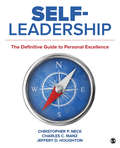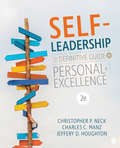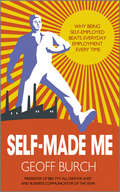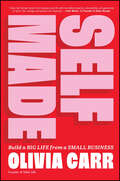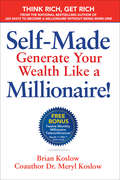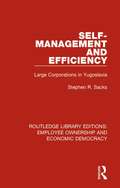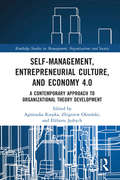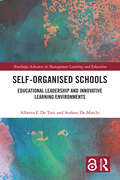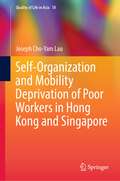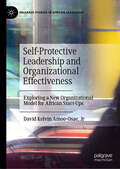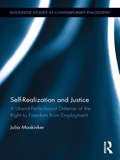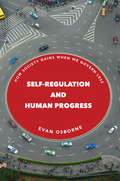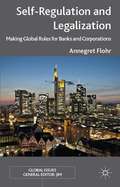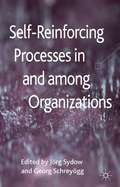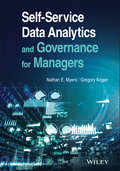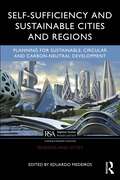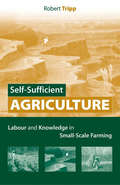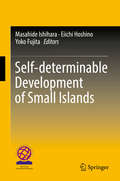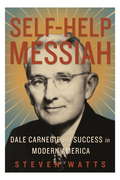- Table View
- List View
Self-Leadership: The Definitive Guide to Personal Excellence
by Dr Christopher P. Neck Dr Jeffery D. Houghton Dr Charles C. ManzWritten by the scholars who first developed the theory of self-leadership (Christopher P. Neck, Charles C. Manz, & Jeffery D. Houghton), Self-Leadership: The Definitive Guide to Personal Excellence offers powerful yet practical advice for leading yourself to personal excellence. Grounded in research, this milestone book is based on a simple yet revolutionary principle: First learn to lead yourself, and then you will be in a solid position to effectively lead others. This inclusive approach to self-motivation and self-influence equips readers with the strategies and tips they need to build a strong foundation in the study of management, as well as enhancing their own personal effectiveness.
Self-Leadership: The Definitive Guide to Personal Excellence
by Dr Christopher P. Neck Dr Jeffery D. Houghton Dr Charles C. ManzWritten by the scholars who first developed the theory of self-leadership (Christopher P. Neck, Charles C. Manz, & Jeffery D. Houghton), Self-Leadership: The Definitive Guide to Personal Excellence offers powerful yet practical advice for leading yourself to personal excellence. Grounded in research, this milestone book is based on a simple yet revolutionary principle: First learn to lead yourself, and then you will be in a solid position to effectively lead others. This inclusive approach to self-motivation and self-influence equips readers with the strategies and tips they need to build a strong foundation in the study of management, as well as enhancing their own personal effectiveness.
Self-Leadership: The Definitive Guide to Personal Excellence
by Dr. Christopher P. Neck Dr. Charles C. Manz Dr. Jeffery D. HoughtonWritten by the scholars who first developed the theory of self-leadership, Self-Leadership: The Definitive Guide to Personal Excellence by Christopher P. Neck, Charles C. Manz, and Jeffery D. Houghton offers powerful yet practical advice for leading oneself to personal excellence. Grounded in the most recently published, cutting-edge self-leadership research, this milestone book is based on a simple yet revolutionary principle: first learn to lead yourself, and you will then be able to effectively lead others. This inclusive approach to self-motivation and self-influence equips readers with the strategies and tips they need to build a strong foundation in the study of management, as well as enhancing their own personal effectiveness. The updated Second Edition resonates with today’s students by featuring contemporary examples and showcasing a greater degree of diversity throughout. New to this Edition Self-Leadership Research features have been updated or replaced to offer the most up-to-date, cutting-edge research, exposing students to timely developments in the field. Real-World Self-Leadership Cases and new Profiles in Self-Leadership are updated to feature new, contemporary personalities that will resonate with today’s diverse students, with more cases featuring women and/or people of color. Self-Leadership in the Movies features have been updated to reflect contemporary people and movies that showcase a greater degree of diversity, offering students relatable, exciting examples to keep them engaged. All in-text examples and supporting citations have been updated.
Self-Leadership: The Definitive Guide to Personal Excellence
by Dr. Christopher P. Neck Dr. Charles C. Manz Dr. Jeffery D. HoughtonWritten by the scholars who first developed the theory of self-leadership, Self-Leadership: The Definitive Guide to Personal Excellence by Christopher P. Neck, Charles C. Manz, and Jeffery D. Houghton offers powerful yet practical advice for leading oneself to personal excellence. Grounded in the most recently published, cutting-edge self-leadership research, this milestone book is based on a simple yet revolutionary principle: first learn to lead yourself, and you will then be able to effectively lead others. This inclusive approach to self-motivation and self-influence equips readers with the strategies and tips they need to build a strong foundation in the study of management, as well as enhancing their own personal effectiveness. The updated Second Edition resonates with today’s students by featuring contemporary examples and showcasing a greater degree of diversity throughout. New to this Edition Self-Leadership Research features have been updated or replaced to offer the most up-to-date, cutting-edge research, exposing students to timely developments in the field. Real-World Self-Leadership Cases and new Profiles in Self-Leadership are updated to feature new, contemporary personalities that will resonate with today’s diverse students, with more cases featuring women and/or people of color. Self-Leadership in the Movies features have been updated to reflect contemporary people and movies that showcase a greater degree of diversity, offering students relatable, exciting examples to keep them engaged. All in-text examples and supporting citations have been updated.
Self-Made Me
by Geoff BurchStop working for the man - break free and make sure you're getting paid what you're worth Stop slogging away 9 - 5 for a set salary (plus the overtime you inevitably do and don't get any credit for). Abandon the day job and go it alone. Start doing what you want to do, when you want to do it. There are currently 4 million self-employed people in the UK -be one of them, join them, set yourself free. It's not about becoming an entrepreneurial whiz-kid, it's about working the way you want to work, on the things you want to work on, and in the location you want to do it from. Remember, you don't have to sit in an office to get a job done. Self-Made Me shows you how to work how and where you want and earn exactly what you're worth - not what an employer wants to get away with giving you. Be your own boss and increase your value. It's never been easier to be self-employed than it is today, with increased communications, mobile working and outsourcing This straight-forward and engaging guide will help you make being self-employed a success Shows you how to get paid what you are actually worth, and how to work as hard or as little required to create the lifestyle you choose Self Made Me is for a new breed of people, and will show you how to make self-employment work for you.
Self-Made: Build a Big Life from a Small Business
by Olivia CarrRewrite your narrative and create a legacy by building a business, your way From Olivia Carr, founder of Shhh Silk, Self-Made: Build a Big Life from a Small Business is an inspirational and practical guide that will empower you to grow a profitable, successful business, no matter your stage of life. A mother at a young age, and without formal qualifications, in her twenties Olivia found herself struggling with climbing debt. Self-Made is the story of how she turned her life around in her thirties and founded Shhh Silk: a multi-million-dollar brand loved by women globally. But more than that, Self-Made is a blueprint that will show you how you can do it too. In Self-Made, Olivia candidly shares her years of hard-won business know-how. You’ll benefit from strategies she developed to stay positive and achieve success, even when the odds are stacked against you. Whatever your industry — ecommerce, bricks and mortar, or side hustle — this is a handbook for taking control of your business and your life. Through practical exercises and step-by-step action plans, you’ll learn how to: Embrace the 6 key traits of a successful entrepreneur Develop a money-making mindset and get to grips with the realities of cash flow and profitability Grow your business, grow your team, and scale up sustainably — even in uncertain times Create an engaging brand story, with PR strategies for building your clients, using influencer marketing, and going viral Balance the challenges of leadership with your own personal growth and wellbeing Self-Made reveals what it takes to build a sustainable, profit-generating business — and the steps you can take to face uncertainty, thrive despite adversity, and realise your dreams. This book will inspire and empower you to overcome setbacks, build your resilience, and use what you have to create the life you really want.
Self-Made: Generate Your Wealth Like a Millionaire! (Self-made Ser.)
by Brian Koslow Dr. Meryl KoslowThe renowned success coach reveals the three fundamental principles for building wealth in this practical and inspirational guide.Making a lot of money is easy—once you know how. This is the reason the rich tend to get richer. When you have this knowledge and put it into action, your financial destiny isn’t simply left to chance. In Self-Made, renowned success coach Brian Koslow teaches you how to make powerful choices that lead to greater profits. You’ll learn how to maintain a “Wealth Mind-Set,” build “Mutually Advantageous Relationships,” and develop “Millionaire Skills.”Presented in an easy-to-read format with summaries, millionaire tips, and exercises, Self-Made is the ultimate study guide for success. By putting Brian’s advice into action, you will increase your effectiveness at creating wealth and finally control your financial destiny!
Self-Management and Efficiency: Large Corporations in Yugoslavia (Routledge Library Editions: Employee Ownership and Economic Democracy #12)
by Stephen R. SacksThe book, first published in 1983, examined whether the Yugoslavs’ extensive implementation of their principle of self-management by small work units was costly in terms of economic efficiency. Were they atomizing their firms into inefficiently small fragments? Was the system of worker self-management appropriate only for small firms? Can a modern industrial enterprise of efficient scale, indeed very large scale, by run that way? In order to answer these questions, the author applies to large firms in former Yugoslavia the transactions cost analysis developed by the economist Oliver Williamson.
Self-Management, Entrepreneurial Culture, and Economy 4.0: A Contemporary Approach to Organizational Theory Development (Routledge Studies in Management, Organizations and Society)
by Agnieszka RzepkaThis book offers practical insight into the changing ways in which organizations operate today. Building on a groundbreaking concept of teal organizations, the book illustrates the practicality of advocating a lack of hierarchy of predetermined positions and the introduction of roles that come with clear responsibilities constantly defined according to current needs. First described by Frederic Laloux, a teal organization is a ground-breaking approach to managing organizations that is being adopted around the world, which turns everyone into a leader. This new paradigm rests on the ideas of wholeness, evolutionary purpose, employee autonomy, and self-management based on peer relationships. Its main assumption is the empowerment of the employee resulting in a change in workplace relationships and a more soulful and purposeful work environment. Drawing on the authors’ research across six different countries, it presents the evolution of self-management and entrepreneurial culture in the current age of Economy 4.0 and examines how the teal concept has been implemented around the world. It examines misconceptions surrounding this novel approach and diagnoses the practical problems connected with implementing it in the current uncertain times. It will be of value to researchers, academics, managers, and students in the fields of management and organizational studies.
Self-Management, Entrepreneurial Culture, and Economy 4.0: A Contemporary Approach to Organizational Theory Development (Routledge Studies in Management, Organizations and Society)
by Agnieszka RzepkaThis book offers practical insight into the changing ways in which organizations operate today. Building on a groundbreaking concept of teal organizations, the book illustrates the practicality of advocating a lack of hierarchy of predetermined positions and the introduction of roles that come with clear responsibilities constantly defined according to current needs. First described by Frederic Laloux, a teal organization is a ground-breaking approach to managing organizations that is being adopted around the world, which turns everyone into a leader. This new paradigm rests on the ideas of wholeness, evolutionary purpose, employee autonomy, and self-management based on peer relationships. Its main assumption is the empowerment of the employee resulting in a change in workplace relationships and a more soulful and purposeful work environment.Drawing on the authors’ research across six different countries, it presents the evolution of self-management and entrepreneurial culture in the current age of Economy 4.0 and examines how the teal concept has been implemented around the world. It examines misconceptions surrounding this novel approach and diagnoses the practical problems connected with implementing it in the current uncertain times. It will be of value to researchers, academics, managers, and students in the fields of management and organizational studies.
Self-Organised Schools: Educational Leadership and Innovative Learning Environments (Routledge Advances in Management Learning and Education)
by Alberto F. De Toni Stefano De MarchiSelf-Organised Schools: Educational Leadership and Innovative Learning Environments describes the results of the research we carried out at fourteen Italian schools that highlight how there is a positive correlation between the capabilities of school self-organization and the innovativeness of learning environments: in other words, the more self-organized schools are, the more innovative learning environments are. The results of this work are part of the strand of research of bottom-up emergency and self-organization, an extremely fruitful trend as shown by Sugata Mitra, the founder of the Self-Organized Learning Environments, according to whom, "education is a self-organized system where learning is an emerging phenomenon". This book gives new insights on self-organization studies, and most of all, to the idea that change - organizational and educational innovation - sparks from the bottom. This book is aimed specifically at school principals of all levels, scholastic reformers, educational scholars, organisation and management consultants who want to innovate learning and management of learning. These actors will benefit drawing useful examples from more than thirty different learning environments worldwide, fourteen examples of schools that self-organize, two frameworks - and two ready-to-use questionnaires - measuring the innovativeness of a learning environment, and the capability of a school to self-organize. Self-organization is the most fascinating future of innovative principals
Self-Organization and Mobility Deprivation of Poor Workers in Hong Kong and Singapore (Quality of Life in Asia #18)
by Joseph Cho-Yam LauThis book focuses on the influence of socio-economic and land-use policies on the commuting problems and quality of life of the poor in Singapore and Hong Kong. It considers the influence of self-organisation: how the mobility of an individual is constituted by structures such as transport systems or socio-economic structural factors, as well as influenced by individual decisions. Where most transport studies focus on the influence of factors such as income inequality, the gender gap, and the built environment, this book fills a gap in paying particular attention to the influence of individual decisions on commuting. Given the prevalence of the former in research, government decision-makers are often constrained by these approaches and fail to understand the commuting problems of the poor. This book argues that the self-organisation approach provides some ideas that are outside the common conceptual framework in conventional transport planning and looks to improve mobility of lower-income commuters. Relevant to social science researchers working in areas such as urban planning and transport, mobility deprivation, and poverty, this book breaks new ground in quality of life studies in the Singapore and Hong Kong contexts.
Self-Organizing Federalism: Collaborative Mechanisms to Mitigate Institutional Collective Action Dilemmas
by Richard C. Feiock John T. ScholzThis book investigates the self-organizing responses of governments and interests to the institutional collective action (ICA) dilemmas of particular concern to students of federalism, urban governance, and regional management of natural resources. ICA dilemmas arise in fragmented systems whenever decisions by one independent formal authority do not consider costs or benefits imposed on others. The ICA framework analyzes networks, joint projects, partnerships, and other mechanisms developed by affected parties to mitigate ICA decision externalities. These mechanisms play a widespread but little-understood role in federalist systems by reshaping incentives in order to encourage coordination/cooperation. The empirical studies of urban service delivery and regional integration of regional resource management address three questions: How does a given mechanism mitigate costs of uncoordinated decisions? What incentives do potential members have to create the mechanism? How do incentives induced by the mitigating mechanism affect its sustainability in a changing environment and its adaptability to other ICA dilemmas?
Self-Protective Leadership and Organizational Effectiveness: Exploring a New Organizational Model for African Start-Ups (Palgrave Studies in African Leadership)
by David Kelvin Amoo-Osae, JrThis book investigates and explores the impact of a self-protective leadership (SPL) style on the organizational effectiveness of start-up businesses within Africa, focusing on Ghana and Kenya. Self-protective leadership is defined as a leadership style that focuses on ensuring the safety and security of individuals and groups through status-enhancing and face-saving tactics. A typical self-protective leader can make decisions, and is free from political influences, but tends to be selfish, ritualistic, and self-centered. The author’s study, presented in this book, demonstrates a surprisingly high preference for SPL among Confucian Asian, Latin American, Middle Eastern, and Sub-Saharan African nations – all of which have a history of colonialism. If this is true, then SPL could be better suited to the business environment in Africa, but particularly amongst start-up enterprises. Examining this phenomenon, and using an explorative analysis of business and culture, the book investigates the extent to which the various dimensions or demonstrations of SPL impact organizational effectiveness in African start-up businesses. A valuable contribution to literature and research on African leadership styles, this is an ideal resource for students and researchers interested in leadership and organizational effectiveness within the African context.
Self-Realization and Justice: A Liberal-Perfectionist Defense of the Right to Freedom from Employment (Routledge Studies in Contemporary Philosophy)
by Julia MaskivkerIn this book, Maskivker argues that there ought to be a right not to participate in the paid economy in a new way; not by appealing to notions of fairness to competing conceptions of the good, but rather to a contentious (but defensible) normative ideal, namely, self-realization. In so doing, she joins a venerable tradition in ethical thought, initiated by Aristotle and developed in the work of important eighteenth and nineteenth century thinkers including Smith, Hume, and Marx.The book engages on-going debates (in both philosophical and real world political and social policy circles) about the provision of basic income grants, necessary to make the possibility of self-realization real for all. Traditional defenses of unconditional welfare benefits emphasize ideals of state neutrality when they claim that society should not discriminate against preferences for leisure in favor of preferences for work. According to these views, the state ought not to interfere with people’s choices about what constitutes the "good life." In contradistinction, Maskivker offers an innovative argument in defense of a particular ideal of the "good life," namely, life-goals directed at the pursuit of self-realization. However, her understanding of self-realization appeals to modern and contemporary values of freedom and pluralism. In a refreshingly new light, the book strikes a balance between fascinating debates on the conditions of human flourishing on the one hand, and heated discussions about the Welfare State on the other.
Self-Regulation and Human Progress: How Society Gains When We Govern Less
by Evan OsborneMost of us are familiar with free-market competition: the idea that society and the economy benefit when people are left to self-regulate, testing new ideas in pursuit of profit. Less known is the fact that this theory arose after arguments for the scientific method and freedom of speech had gone mainstream—and that all three share a common basis. Proponents of self-regulation in the realm of free speech have argued that unhindered public expression causes true ideas to gain strength through scrutiny. Similarly, scientific inquiry has been regarded as a self-correcting system, one in which competing hypotheses are verified by multiple independent researchers. It was long thought that society was better left to organize itself through free markets as opposed to political institutions. But, over the twentieth century, we became less confident in the notion of a self-regulating socioeconomy. Evan Osborne traces the rise and fall of this once-popular concept. He argues that—as society becomes more complex—self-regulation becomes more efficient and can once again serve our economy well.
Self-Regulation and Legalization
by Annegret FlohrDeparting from an International Relations perspective, this book inquires how industry self-regulation affects the role of international law in governing global banks. It provides case studies of the Wolfsberg Principles and the Equator Principles.
Self-Reinforcing Processes in and among Organizations
by Jörg Sydow Georg SchreyöggManagement and organization research has rediscovered individual agency, innovation and entrepreneurship. As such, there is a risk of overlooking the power of self-reinforcing processes in and among organizations. This volume redirects attention to these processes, including: escalating commitment, organizational imprinting and path dependence.
Self-Service Data Analytics and Governance for Managers
by Nathan E. Myers Gregory KoganProject governance, investment governance, and risk governance precepts are woven together in Self-Service Data Analytics and Governance for Managers, equipping managers to structure the inevitable chaos that can result as end-users take matters into their own hands Motivated by the promise of control and efficiency benefits, the widespread adoption of data analytics tools has created a new fast-moving environment of digital transformation in the finance, accounting, and operations world, where entire functions spend their days processing in spreadsheets. With the decentralization of application development as users perform their own analysis on data sets and automate spreadsheet processing without the involvement of IT, governance must be revisited to maintain process control in the new environment. In this book, emergent technologies that have given rise to data analytics and which form the evolving backdrop for digital transformation are introduced and explained, and prominent data analytics tools and capabilities will be demonstrated based on real world scenarios. The authors will provide a much-needed process discovery methodology describing how to survey the processing landscape to identify opportunities to deploy these capabilities. Perhaps most importantly, the authors will digest the mature existing data governance, IT governance, and model governance frameworks, but demonstrate that they do not comprehensively cover the full suite of data analytics builds, leaving a considerable governance gap. This book is meant to fill the gap and provide the reader with a fit-for-purpose and actionable governance framework to protect the value created by analytics deployment at scale. Project governance, investment governance, and risk governance precepts will be woven together to equip managers to structure the inevitable chaos that can result as end-users take matters into their own hands.
Self-Sufficiency and Sustainable Cities and Regions: Planning for Sustainable, Circular and Carbon-Neutral Development (Regions and Cities)
by Eduardo MedeirosThe concept of self-sufficiency involves the notion of sustainable, circular, and carbon-neutral cities. This book examines how urban planning can lead to greater self-sufficiency.It sheds light on how urban and regional circular and self-sufficiency development can effectively contribute towards the ultimate goals of the United Nations (UN) Agenda 2030 and the European Union (EU) Green Deal. It not only embraces the scientific fields of regional and urban studies but also addresses environmental sustainability-related and regional resilience aspects, such as renewable energy production, sustainable mobility, and the circular economy. This book offers a full toolkit of knowledge on how to effectively implement planning approaches for circular and self-sufficiency development at both urban and regional levels. It begins by presenting a theoretical framework and debate on urban and regional planning approaches that can effectively make cities and regions circular and self-sufficient in certain development domains, such as producing intra-city electric energy, sustainable mobility, and promoting a circular economy. Further, it advances a range of policy development proposals aiming at providing a comprehensive introduction to contemporary thinking about how cities and regions can design innovative planning and governance processes and, where appropriate, build capacity to implement systemic and integrated climate-neutral policies, building on existing place-based territorial capital and experiences developed by local and regional networks. The chapters are written by established authors in their respective domains.This book will thoroughly prepare students and provide knowledge to academics, researchers, and policymakers in the fields of urban and regional planning/development and studies, environmental sustainability, regional resilience, human geography, economic development, and public/EU/UN policies.
Self-Sufficient Agriculture: Labour and Knowledge in Small-Scale Farming
by Robert TrippLow external-input technology (or LEIT) is an increasingly prominent subject in discussions of sustainable agriculture. There are growing calls for self-sufficient agriculture in an era experiencing diminishing returns from reliance upon expensive synthetic pesticides and fertilizers. There are many reasons to support strategies for low external input farming, including a concern for environmental sustainability, increased attention to resource-poor farmers and marginal environments, and the conviction that a better use of local resources in small-scale agriculture can improve farm productivity and innovation. But despite the increased attention to self-sufficient agriculture, there is little evidence available on the performance and impact of LEIT. This book examines the contributions and limitations of low external input technology for addressing the needs of resource-poor farmers. For the first time a balanced analysis of LEIT is provided, offering in-depth case studies, an analysis of the debates, an extensive review of the literature and practical suggestions about the management and integration of low external input agriculture in rural development programmes.
Self-determinable Development of Small Islands
by Masahide Ishihara Eiichi Hoshino Yoko FujitaThis book aims to clarify the present situation of the relations between small island countries and territories on the one hand and the great powers, mainland areas, and mega-islands on the other, and explores how small island countries and territories preserve and build their identity under globalization. This book is divided into five parts. The first part presents papers on issues that are related to Okinawa: the American military presence, the formation of a global human network, and the history of and language revitalization in Okinawa. The second part includes papers on security in East Asia and the Pacific Region: the history of and present issues in international relations within the South and East China Sea areas. The third part presents papers on economic issues and social developments on small islands. The fourth part deals with ocean policies and marine resource management in the Pacific Region by the United States, Australia, and Japan. Finally, the fifth part presents papers on the revitalization of three indigenous languages. All the chapters of the book are based on the achievements of the research project "Towards New Island Studies: The Ryukyus as an academic node between East Asia and Oceania" conducted by the International Institute for Okinawan Studies at the University of the Ryukyus. This 5-year project was funded by the Japanese Ministry of Education, Culture, Sports, Science and Technology and aimed to contribute academically to the creation of sustainable and self-determinable societies in small island regions. This work will be extremely useful and informative for readers in small island countries and territories and for researchers who are interested in small island issues to understand the current situation and who wish to consider effectual and feasible solutions.
Self-help Messiah
by Steven WattsAn illuminating biography of the man who taught Americans "how to win friends and influence people" Before Stephen Covey, Oprah Winfrey, and Malcolm Gladwell there was Dale Carnegie. His book, How to Win Friends and Influence People, became a best seller worldwide, and Life magazine named him one of "the most important Americans of the twentieth century." This is the first full-scale biography of this influential figure. Dale Carnegie was born in rural Missouri, his father a poor farmer, his mother a successful preacher. To make ends meet he tried his hand at various sales jobs, and his failure to convince his customers to buy what he had to offer eventually became the fuel behind his future glory. Carnegie quickly figured out that something was amiss in American education and in the ways businesspeople related to each other. What he discovered was as simple as it was profound: Understanding people's needs and desires is paramount in any successful enterprise. Carnegie conceived his book to help people learn to relate to one another and enrich their lives through effective communication. His success was extraordinary, so hungry was 1920s America for a little psychological insight that was easy to apply to everyday affairs. Self-help Messiah tells the story of Carnegie's personal journey and how it gave rise to the movement of self-help and personal reinvention.
